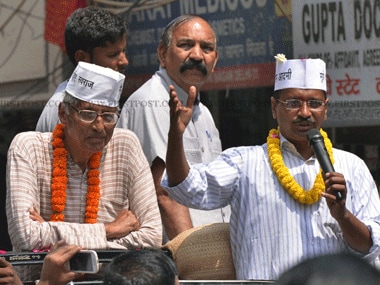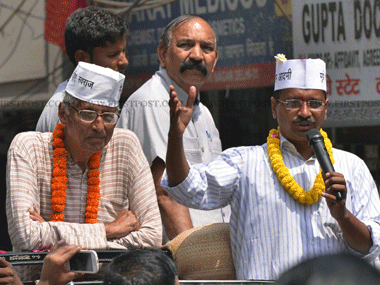‘Local’ seems to be trumping the ‘national’ in Delhi this Lok Sabha election. Having started the trend with the ‘one manifesto one constituency’ in the 2013 assembly election, Aam Admi Party (AAP) candidates are continuing to aggressively campaign on local issues even though they are fighting a Parliamentary election. If AAP’s New Delhi Lok Sabha candidate is leading a ‘jhadu chalao’ campaign to clean the streets of a colony to expose the ‘corrupt corporators’ on one day, the party’s North East candidate Anand Kumar is releasing a constituency-level manifesto that promises ‘to regularise unauthorised colonies, set up an East campus for Delhi University, increase frequency of DTC buses’, on another. Visibly absent is any rhetoric on national issues, other than, of course, the chorus on ending corruption. Top on the campaign agenda of AAP’s potential MPs seems to be offering voters practical solutions that can better the quality of their everyday life, improve their immediate surroundings, decentralise decision-making. [caption id=“attachment_1464553” align=“alignleft” width=“380”] Rajmohan Gandh, AAP candidate from East Delhi along with party leader Arvind Kejriwal. Naresh Sharma/Firstpost[/caption] “My vision is to link slum and society. I want to bring Japanese and Korean technologies to crowded areas here, where drains are blocked, to effect a change, bring about better sanitation practices,” Raj Mohan Gandhi, AAP’s East Delhi candidate, told Hindustan Times
this week. “Urban infrastructure is in bad shape in the New Delhi constituency. Architects, urban planners and ordinary men will be encouraged to participate in the decision-making process,” said Khetan, who is taking on two-time Congress MP Ajay Maken and BJP’s Meenakshi Lekhi, speaking at the release
AAP’s New Delhi-specific manifesto.
Not surprisingly, it is a strategy that seems to getting a lot of response especially from residents in resettlement, unauthorised colonies and slum colonies. Interestingly, it is also attracting young people disillusioned with ideology-driven grand narratives of politicians to AAP’s cause. “All these parties have grand manifestos, they have specific agendas. I think they are utopian and they don’t relate to everyday life. These may be insignificant to other political but they are priorities for AAP….We need to deal with immediate problems of poverty, illiteracy, education. If we want to bring in social change, we have to first provide the amenities for change. The best part about AAP is that it does not have too much of an ideological basis, it deals with the everyday problems.Sometimes ideology can become a hindrance to achieving your goals,” said Urmi Bhattacharya, a PhD student from
JNU, speaking to Firstpost during an earlier interview.
Bhattacharya is campaigning for her professor Anand Kumar, who is AAP’s candidate from North East Delhi. Evidently worried by the impact and appeal of AAP’s strategy to focus on local issues in their campaign trails, the BJP is trying to play catch-up. In a first, the BJP last week released a Delhi-specific manifesto. The manifesto, which reads like an assembly election manifesto, promises Delhi’s voters, among other things, an anti-corruption helpline, full statehood for Delhi and reduction of power tariffs. Taking a leaf out AAP’s campaign strategy, one of the BJP candidates is even mulling the release of a manifesto specific to his constituency. While addressing local issues can help candidates connect with voters better, fighting national elections with a focus on the constituency, can have its drawbacks say political observers. Says Sanjay Kumar, political analyst and Director, Centre for the Study of Developing Societies, “It is a good beginning as the candidate would be in a position to address or at least to promise in the manifesto that these are the problems and this is what the party will try and address when it wins the election in that constituency. The difficulty is that while you can release unique manifestos for 4-5 constituencies, it is not feasible for a party to issue manifestos for all 400-odd constituencies that it is contesting. And it could lead to a situation where there may be contradictions between manifestos and then it might become difficult for leaders to defend what their stand is, if such contradictions arise.” Reacting to AAP’s focus on the constituency-specific campaigns in a national election, Kumar said, “I would not support this kind of stand by a candidate who is standing for a national election because these are municipal issues. Candidates should be focussing on national issues rather than issues of garbage, drainage and street lighting.” Some of AAP’s supporters also agree that a local campaign for a national election could cut both ways. Says Vivek Sharma, a lawyer who feels AAP is still the best option for Delhi voters, “It can be productive as well as counter-productive. On one hand, the voter would feel that the candidate knows about their local problems. On the other hand, the voter may feel AAP is not talking about a national agenda. But I think people, ultimately, are more keen about their representative knowing what the local issues are.”
Rajmohan Gandh, AAP candidate from East Delhi along with party leader Arvind Kejriwal. Naresh Sharma/Firstpost[/caption] “My vision is to link slum and society. I want to bring Japanese and Korean technologies to crowded areas here, where drains are blocked, to effect a change, bring about better sanitation practices,” Raj Mohan Gandhi, AAP’s East Delhi candidate, told Hindustan Times
this week. “Urban infrastructure is in bad shape in the New Delhi constituency. Architects, urban planners and ordinary men will be encouraged to participate in the decision-making process,” said Khetan, who is taking on two-time Congress MP Ajay Maken and BJP’s Meenakshi Lekhi, speaking at the release
AAP’s New Delhi-specific manifesto.
Not surprisingly, it is a strategy that seems to getting a lot of response especially from residents in resettlement, unauthorised colonies and slum colonies. Interestingly, it is also attracting young people disillusioned with ideology-driven grand narratives of politicians to AAP’s cause. “All these parties have grand manifestos, they have specific agendas. I think they are utopian and they don’t relate to everyday life. These may be insignificant to other political but they are priorities for AAP….We need to deal with immediate problems of poverty, illiteracy, education. If we want to bring in social change, we have to first provide the amenities for change. The best part about AAP is that it does not have too much of an ideological basis, it deals with the everyday problems.Sometimes ideology can become a hindrance to achieving your goals,” said Urmi Bhattacharya, a PhD student from
JNU, speaking to Firstpost during an earlier interview.
Bhattacharya is campaigning for her professor Anand Kumar, who is AAP’s candidate from North East Delhi. Evidently worried by the impact and appeal of AAP’s strategy to focus on local issues in their campaign trails, the BJP is trying to play catch-up. In a first, the BJP last week released a Delhi-specific manifesto. The manifesto, which reads like an assembly election manifesto, promises Delhi’s voters, among other things, an anti-corruption helpline, full statehood for Delhi and reduction of power tariffs. Taking a leaf out AAP’s campaign strategy, one of the BJP candidates is even mulling the release of a manifesto specific to his constituency. While addressing local issues can help candidates connect with voters better, fighting national elections with a focus on the constituency, can have its drawbacks say political observers. Says Sanjay Kumar, political analyst and Director, Centre for the Study of Developing Societies, “It is a good beginning as the candidate would be in a position to address or at least to promise in the manifesto that these are the problems and this is what the party will try and address when it wins the election in that constituency. The difficulty is that while you can release unique manifestos for 4-5 constituencies, it is not feasible for a party to issue manifestos for all 400-odd constituencies that it is contesting. And it could lead to a situation where there may be contradictions between manifestos and then it might become difficult for leaders to defend what their stand is, if such contradictions arise.” Reacting to AAP’s focus on the constituency-specific campaigns in a national election, Kumar said, “I would not support this kind of stand by a candidate who is standing for a national election because these are municipal issues. Candidates should be focussing on national issues rather than issues of garbage, drainage and street lighting.” Some of AAP’s supporters also agree that a local campaign for a national election could cut both ways. Says Vivek Sharma, a lawyer who feels AAP is still the best option for Delhi voters, “It can be productive as well as counter-productive. On one hand, the voter would feel that the candidate knows about their local problems. On the other hand, the voter may feel AAP is not talking about a national agenda. But I think people, ultimately, are more keen about their representative knowing what the local issues are.”
AAP's Delhi poll strategy: Going local to win national
Pallavi Polanki
• April 6, 2014, 11:51:53 IST
Aam Admi Party (AAP) candidates are continuing to aggressively campaign on local issues even though they are fighting a Parliamentary election.
Advertisement
)
End of Article